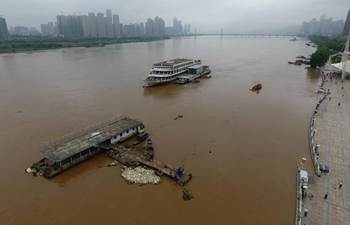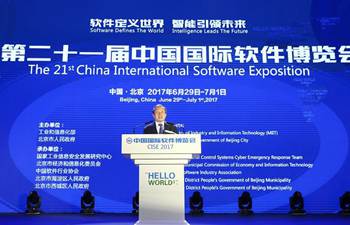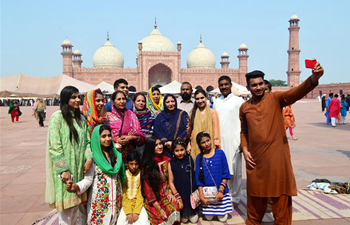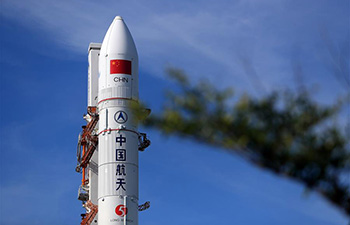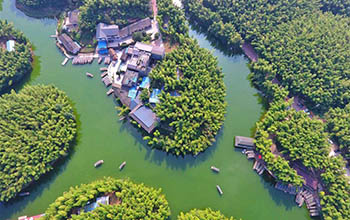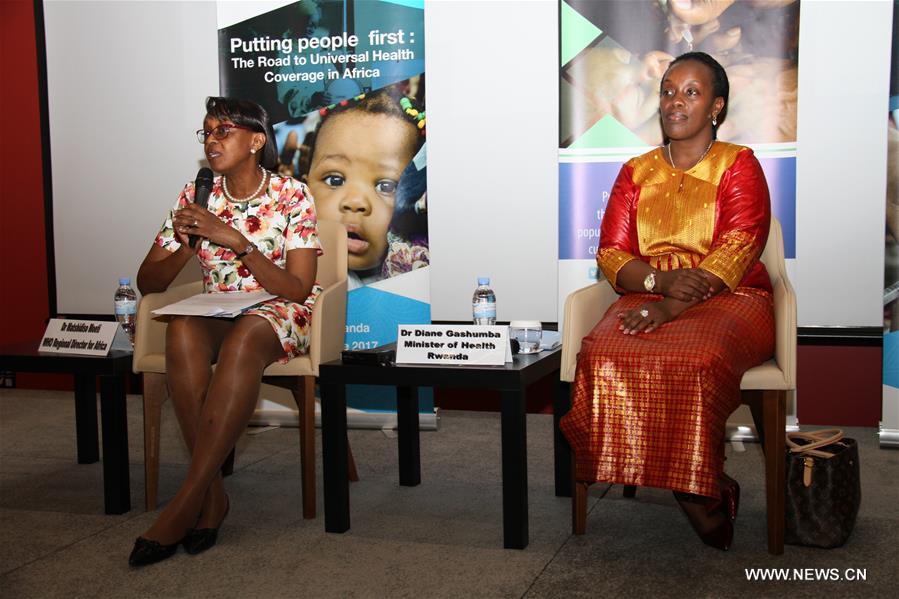
The World Health Organization (WHO) Regional Director for Africa Matshidiso Moeti (L) and Rwanda's Minister of Health Diane Gashumba attend a press conference after the closing ceremony of WHO's first Africa Health Forum, in Kigali, capital of Rwanda, on June 28, 2017. The World Health Organization's first Africa health forum concluded here Wednesday with commitments to achieving universal health coverage (UHC). (Xinhua/Lyu Tianran)
KIGALI, June 28 (Xinhua) -- The World Health Organization's first Africa health forum concluded here Wednesday with commitments to achieving universal health coverage (UHC).
The two-day forum attracted over 700 delegates from a wide range of backgrounds including academics, ministers of health, intergovernmental agencies, academics, civil society, philanthropic foundations, private sector and youth organizations.
The forum under the theme: "Putting people first: The Road to Universal Health Coverage in Africa" was planned to be a biennial platform to engage key stakeholders in reviewing progress towards the health-related Sustainable Development Goals (SDGs).
A "Call-to-Action" read at the closing ceremony included commitment and appeals reached by the delegates.
The participants were committed to key aims including keeping UHC as the overarching approach for attaining SDG3 of ensuring healthy lives and promoting well-being for all at all ages, strengthening health workforce development and sustainability, including community health workers to deliver quality health services, building, re-orienting and re-aligning health systems towards UHC and so on.
They also called upon African governments to provide leadership and stewardship for actions aimed at creating consultative planning platforms and regulatory frameworks for the attainment of UHC, to increase domestic investments, to mobilize and coordinate all stakeholders for a common purpose, to forge partnerships with bilateral and multilateral agencies, the private sector and civil society, and to monitor and report progress.
The delegates also called on other sides like WHO, the African Union Commission, the private sector and so on to act to support the health sector in Africa.
"We recognize that the 2030 Agenda Sustainable Development provides a unique opportunity for repositioning primary prevention in health service delivery and it also an ideal platform for catalyzing inter-sectoral engagement and action," said WHO Regional Director for Africa Matshidiso Moeti at the closing ceremony.
"I'm also gratified by commitment to stronger collaboration and engagement among all stakeholders behind the goal of achieving UHC to ensure and improve financial protection for the vulnerable people in Africa," she said.
The forum provides a great opportunity to discuss and find solutions, said Diane Gashumba, minister of health of Rwanda. "Let it be a solid foundation of a successful journey that will take our citizens to a better life we all deserve," she added.
While addressing a press conference after the closing ceremony, Moeti said the forum had a very intensive and rich sharing of ideas, information and suggestions about UHC, essentially health development in Africa.
Different actors on health discussed how Africa is progressing and how Africa is going to move towards better UHC, she said.
"One of the most important things emerged during discussion is we need better financing for health, we need to be more efficient with allocating resources that are already emplaced," said the regional director.
We need to use data, make policy decisions and support governments to implement programs that could cover those gaps for ensuring equity, she said.
"Most importantly for equity and justice, we move away from people having to pay directly for healthcare and work towards financial and social protection, insurance schemes and pulling resources," she said.
Discussions at the forum also acknowledged the progress in health made over the past years, like improved life expectancy at birth, reductions in adult mortality rate, under-five mortality rate and maternal mortality ratio.
They also recognized "old enemies" such as HIV, TB and malaria and new threats presented by non-communicable diseases and climate change.
Delegates emphasized the need for strong health systems to ensure public health security, including better preparedness and response to disease outbreaks and epidemics. They also underscored the importance of investing in adolescent health now, said the press release.
WHO will organize another Africa health forum in two years, according to Moeti.




